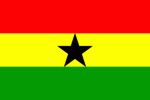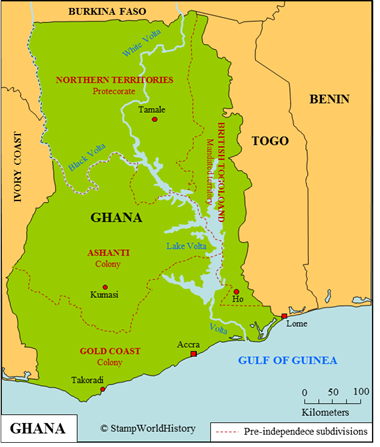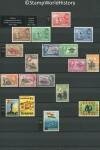
Ghana
Quick reference
General issues: Independent within the British Commonwealth 1957-1960, Republic 1960-Present
Country name on general issues: Ghana
Currency: 1 Pound = 20 Shilling, 1 Shilling = 12 Pence 1957-1965, 1 Cedi = 100 Pesewas 1965-Present
Population: 6 034 000 in 1957, 25 900 000 in 2013
Political history Ghana
Ghana is located in western Africa. The population consists of Niger-Congo peoples – the largest population groups being the Fante on the coast, the Ashanti in central Ghana and the Ewe in eastern Ghana along the border with Togo. Several European nations have, since the 15th century, had trade settlements in the future Ghana – then called the Gold Coast. It was the British who would eventually colonize Ghana. The British first extended their influence along the coast. In the course of the 19th century, the British settlements went through a number of administrative changes. By 1874, Gold Coast was ultimately established as a separate colony. In central Ghana the British fought four Ashanti Wars with the Ashanti kingdom. The British ultimately prevailed in 1896 – the Ashanti kingdom becoming a protectorate and, from 1901, a colony. Finally, the British in 1897 proclaimed a protectorate over the Northern Territories that were brought under effective British rule in subsequent years. These three de jure separate entities were de facto administered as part of Gold Coast. In WWI the territory was further extended with British Togoland – occupied from 1914 and a League of Nations mandated territory from 1922. British Togoland was equally de facto administered as part of Gold Coast.
The call for independence after WWII becomes politically manifest. Going through a number of steps towards self government, Gold Coast gains independence within the British Commonwealth as Ghana in 1957. British Togoland, upon independence, de jure becomes an integral part of Ghana after a 1956 referendum in which the population voted for association with Ghana. Ghana becomes a republic in 1961. From independence until 1993, Ghana has swung from being a democratic multi party state to an autocratic one party rule and back a number of times. From 1993 until today, Ghana has known relative political stability as a multi party state.
Ghana, under British rule, developed well economically, due to the introduction of first coffee then cocoa as a cash crop. Natural resources – gold and timber – furthered economic development. Economic development translated into infrastructural and social development. By the end of British rule, Ghana was one of the most developed countries in western Africa. The years of political changes have not contributed to a further development of the Ghana economy. Since 1993, though, a more stable political context has translated into a, by and large, upward curve for the Ghana economy that currently compares well to that of the neighboring countries.
Postal history Ghana

1957 – Independence. The portrait is of Kwame Nkruma, the first prime minister of independent Ghana.
The first stamps used in Ghana were the stamps issued for Gold Coast from 1875. These were superseded by the issues of independent Ghana from 1957. The first set issued commemorates independence. Initially, Ghana has issued stamps mainly with themes of national interest. Gradually Ghana has shifted to themes that, from the 1990’s on, are almost exclusively aimed at the thematic collectors market.
Album pages
← Previous page: GhadamesNext page: Gold Coast →




Hi,
please change the flag. They used this flag during very short period 1962-1966.
Best regards,
Admir
Admir
Thanks for pointing this out. Flag changed.